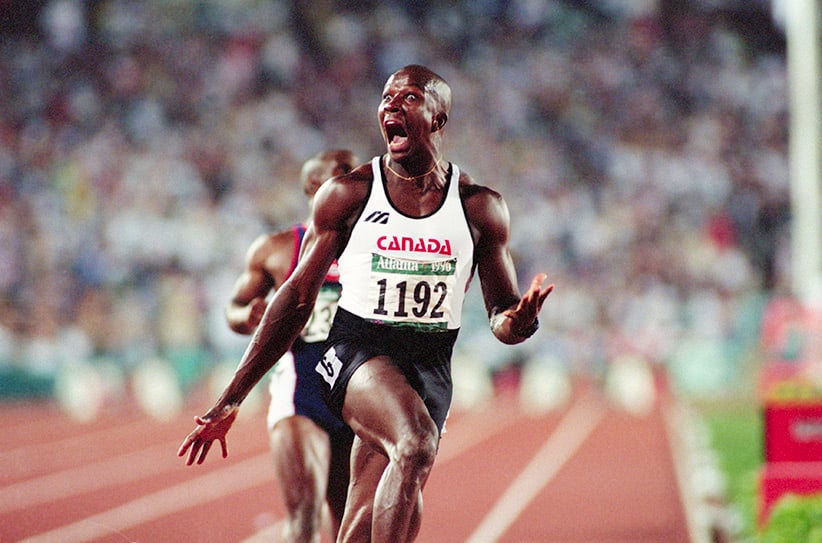‘At 70 m, I knew I had won’
Donovan Bailey on his Olympic jitters
Donvan Bailey. (Photograph by Dillan Cools)
Share
When the gun went off, Donovan Bailey was the last to move. His reaction time of 0.174 seconds was still faster than the blink of an eye, but an eternity behind the six other men competing in the 100-m finals at the 1996 Atlanta Games. His immediate impulse was to panic. “I’m thinking, ‘Oh, no!’ ” he recalls. The screw-up had cost him a crucial fraction of a second; the margin between Olympic victory and being an also-ran. Now he needed to find the patience to fix it. “I had to get back to worrying about accelerating, breathing and my body position. And be confident that my top-end speed was better than all those other guys.”
FROM THE ARCHIVES: Maclean’s reports on the troubled 1996 Atlanta Summer Games
Donovan was the reigning world champion, but Olympic gold had always been the goal. In the months before the Games, he and his coach, Dan Pfaff, had prepared for every imaginable variable on race night, including wind, rain and humidity. The sprinter stayed away from Atlanta until the last possible moment, flying in the day before the preliminaries and then secluding himself in a luxury villa with his support staff, training partners and a personal chef, far from the athletes’ village. Yet Donovan was nervous. “It’s the biggest show on Earth,” he says. He hardly slept the night before the heats, and when he lined up in the blocks the next morning, he was shaking.
The jitters subsided after he started running, and he cruised into the semis, securing a shot at a medal with the third-fastest time, and feeling he had something in reserve. To this day, Donovan can’t really explain why he was so slow out of the blocks. Maybe it was the three false starts that culminated in the disqualification of his British rival, Linford Christie. Perhaps, deep down, he was concerned about the man to his left, Frankie Fredericks of Namibia, who had beaten him handily in Helsinki just a few weeks before. He never needed to figure it out.
[widgets_on_pages id=”110-back”]
By the time Donovan hit full speed at the 45-m mark, he had caught Fredericks and the rest of the pack. Down the back stretch, he reeled in the front-runner, Ato Boldon of Trinidad and Tobago. “At 70 m, I knew I had won,” he says. “I focused on not laying back or pressing too hard. Just keeping my rhythm.”
As Donovan crossed the finish line, he looked to his right. “Everything was silent and in slow motion. I could see a bunch of guys jumping up and down and waving a Canadian flag.” Then he glanced left, to check his time on the track-side scoreboard. His wide, open-mouthed scream of joy came before he even realized that 9.84 was a new world record. The sound snapped back on, and events unfurled at their normal pace. He was the world’s fastest man.

Exactly one week later, Donovan and the other members of Canada’s 4×100-m men’s relay team—Robert Esmie, Glenroy Gilbert and Bruny Surin—made it double gold. (Carlton Chambers also received a medal for running in the heats and the semis.) Their race already won, Bruny started celebrating the moment he handed the baton to Donovan for the final leg, and the 100-m champion crossed the line with his right arm pointed high to the sky.
Donovan’s favourite memories of Atlanta aren’t the podiums or the anthems. They’re the couple of quiet days between the races when he handed out free shoes from Adidas, one of his sponsors, to athletes from poorer nations. Or the time he met boxing great Muhammad Ali, who lit the Olympic cauldron. “He shook my hand and called me ‘champ,’ ” Donovan says with a smile. — Jonathon Gatehouse
(Portrait by Dillan Cools)
[widgets_on_pages id=”1960s”]
[widgets_on_pages id=”110-post”]